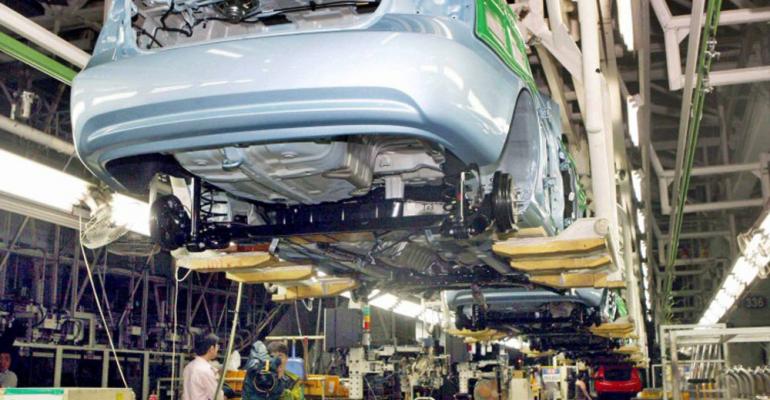After a nearly 3-month vigil, two workers at a Hyundai factory in Ulsan, Korea, continue to perch on a pylon supporting high-voltage wires that is more than 60-ft. (18-m) high and located outside the factory gate.
Choe Byeong-seung and Cheon Ui-bong are demanding the auto maker convert all of its in-plant contract workers to regular-employee status, and despite being served an injunction last week requested by Korea Electric Power that owns and operates the tower, they insist they will not leave.
The two have maintained their protest from this dangerous and uncomfortable position since Oct. 17. They have tied themselves to steel girders with ropes to keep from falling when asleep or shifting positions during the day.
Neither wind, rain nor winter weather have discouraged them. They receive food by rope or by intrepid climbers, and lower waste the same way.
Throughout the ordeal, Hyundai officials have held 14 meetings with the temporary workers’ union, trying to resolve the so-called contract-employee matter. The auto maker employs 6,800 contract workers in its Korean auto plants, all of them employees of subcontractors.
Both the Hyundai regular workers’ union and the temporary workers’ union want all 6,800 contract workers converted to regular-employee status.
The unions say contract workers are defacto employees of Hyundai because they work on the plant floor alongside regular workers and meet the same criteria as regular workers. However, they are paid roughly half as much and do not receive the regular workers’ negotiated benefits.
One of the protesting pole sitters, Choe, 37, is the well-known contract worker who won a landmark suit filed against the auto maker that was upheld by the Supreme Court of Korea. He was fired from his contact-worker job eight years ago because he was demanding to be reclassified as a Hyundai employee, court records show.
In July 2010 and again in February 2012, the Supreme Court ruled in Choe’s favor. The court stated he was a full-time Hyundai regular employee because he had been on the job for more than two years, worked alongside regular workers, performed the same tasks and reported to a Hyundai manager.
Union officials believe the Supreme Court ruling applies not just to Choe but to all of Hyundai’s contract workers. Choe thinks so, too, and that’s why he refuses to leave the pylon.
Hyundai spokesmen say the company is willing to apply the Supreme Court decision but interprets the ruling to apply only to Choe and not to the other contract employees. The auto maker has some support from the Ulsan Region court, which reviewed the matter and cautioned the ruling should not be “over-interpreted” so as to apply generally beyond Choe.
Choeand Cheon have told unionists by phone they refuse to budge until the matter is resolved in favor of all contract workers. The recent injunction orders a fine of roughly $300 a day for every day the protestors stay on the tower beyond Jan. 12.
In an effort to resolve the standoff, Hyundai announced on its Intranet in-plant communications system Monday that it was hiring Choe as a regular employee, effective Jan. 9. However, Choe had to begin work promptly or it would not be possible to “maintain an employment-contract relationship” with him.
Most union members believe that Hyundai, having now agreed to take Choe on as a full-time employee, is at the same time threatening to fire him if he does not come down from the tower.
Sources at Hyundai say such drastic action is not likely, given the significance of the case, and suggest Choe could be classified as being on annual leave or even on vacation while he decides whether to end his protest.
But possible dismissal action is a mute point for Choe, who says today that while he would like to be working he is not leaving his perch because he is demonstrating for all Hyundai contract employees and not just for himself. He promises to remain up in the air until all of the others are offered regular-employee status.
Cheon, who is secretary general of the temporary workers’ union at Ulsan, also plans to stay on his perch. Police have asked the local court to issue an arrest warrant for him, alleging he is responsible for damage caused in the plant when the temporary workers held a sit-in demonstration in November 2010.
The court has refused, saying Cheon is in plain sight for everyone to see and not a flight risk.





